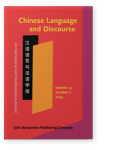Myth of identity
Styling the authentic “Hong Konger” in Wong Tze-wah’s standup comedies
This study delves into the stylization of a unique and dynamic Hong Kong identity through examining a series of
Cantonese standup comedies performed by the Hong Kong comedian, Wong Tze-wah, from 1993 to 2003. It explains the ways that Wong’s
standup comedies become the stylistic and semiotic resources which not merely iconically and symbolically represent the reality of
Hong Kong society; rather, they index many modalities of Hong Kongers’ questioning of authenticity and the relationship between
China and Hong Kong. It suggests that the comic performance, as a meaning-making process, helps to shape and reproduce the local
ideologies of identity, and to challenge the power underlying the discourse of China-Hong Kong relations.
Article outline
- 1.Introduction
- 1.1Standup comedy in Hong Kong
- 1.2Indexicality and language identity
- 1.3Styling identity and indexing authenticity
- 2.Methodology and data source
- 3.Analysis
- 3.1Articulating the Handover by metaphors
- 3.2Parodying the economic crisis
- 4.Conclusion
- Notes
-
References
References (28)
Chan, Roy
2019 “
The Revolutionary Metapragmatics of Laughter in Zhao Shuli’s Fiction.” In
Maoist Laughter, ed., by
Jason McGrath,
Zhuoyi Wang, and
Ping Zhu, 147–161. Hong Kong: University of Hong Kong Press.


Chun, Elaine
2009 “
Ideologies of Legitimate Mockery: Margaret Cho’s Revoicings of Mock Asian.” In
Beyond Yellow English: Toward a Linguistic Anthropology of Asian Pacific America, ed., by
Angela Reyes, and
Adrienne Lo, 261–287. Oxford: Oxford University Press.


Coupland, Nikolas
2007 Style: Language Variation and Identity. New York: Cambridge University Press.


Coupland, Nikolas
2010 “
The Authentic Speaker and The Speech Community.” In
Language and Identities, ed., by
Carmen Llamas, and
Dominic Watt, 99–112. Edinburgh: Edinburgh University Press.


Danesi, Marcel
2013 “
On the Metaphorical Connectivity of Cultural Sign Systems.”
Signs and Society 1(1): 33–49.


Davis, Murray
1993 What’s So Funny? The Comic Conception of Culture and Society. Chicago: University of Chicago Press.

Eckert, Penelope
2014 “
The Trouble with Authenticity.” In
Indexing Authenticity: Sociolinguistic Perspectives, ed., by
Veronique Lacoste,
Jakob Leimgruber, and
Thiemo Breyer, 56–68. Berlin/Boston: De Gruyter.


Goodwin, Charles
1999 “
Action and Embodiment within Situated Human Interaction.”
Journal of Pragmatics 32(10): 1489–1522.


Hung, Lee Shiu
2003 “
The SARS Epidemic in Hong Kong: What Lessons Have We Learned?”
Journal of the Royal Society of Medicine 96(8): 374–378.


Johnstone, Barbara
2010 “
Locating Language in Identity.” In
Indexing Authenticity: Sociolinguistic Perspectives, ed., by
Veronique Lacoste,
Jakob Leimgruber, and
Thiemo Breyer, 29–38. Berlin/Boston: De Gruyter.

Johnstone, Barbara
2014 “
100% Authentic Pittsburgh: Sociolinguistic Authenticity and The Linguistics of Particularity.” In
Indexing Authenticity: Sociolinguistic Perspectives, ed., by
Veronique Lacoste,
Jakob Leimgruber, and
Thiemo Breyer, 117–133. Berlin/Boston: De Gruyter.


Johnstone, Barbara, and Scott F. Kiesling
2008 “
Indexicality and Experience: Exploring the Meanings of /Aw/-Monophthongization In Pittsburgh.”
Journal of Sociolinguistics 12(1): 5–33.


Lai, Mee Ling
2011 “
Cultural Identity and Language Attitudes – Into the Second Decade of Postcolonial Hong Kong.”
Journal of Multilingual and Multicultural Development 32(3): 249–264.


Lakoff, George
2006 Thinking Points: Communicating Our American Values and Vision. New York: Farrar, Straus and Giroux.

Mintz, Lawrence
1983 “
Humor and Popular Culture.” In
Handbook of Humor Research: Volume II, ed., by
Paul E. McGhee, and
Jeffrey H. Goldstein, 130–42. New York: Springer-Verlag.


Peirce, Charles S.
,
et al. 1994 The Collected Papers of Charles Sanders Peirce. Charlottesville: InteLex Corporation.

Silverstein, Michael, and Urban, Greg
1996 Natural Histories of Discourse. Chicago and London: The University of Chicago Press.

Silverstein, Michael
2003 “
Indexical Order and The Dialectics of Sociolinguistic Life.”
Language & Communication 23(3–4): 193–229.


Tsang, Wai King, and Wong, Matilda
2004 “
Constructing A Shared “Hong Kong Identity” In Comic Discourses.”
Discourse & Society 15(6): 767–785.


Watt, Dominic
2010 “
The Identification of the Individual Through Speech.” In
Language and Identities, ed., by
Carmen Llamas, and
Dominic Watt, 76–85. Edinburgh: Edinburgh University Press.


Wong, Andrew D.
2015 “
A Quest for Linguistic Authenticity: Cantonese and Putonghua in Postcolonial Hong Kong.”
41st Annual Meeting of the Berkeley Linguistics Society, Berkeley, CA
7–8 February 2015, 563–576. Berkeley: Berkeley Linguistics Society.


Wong, May
2017 Hong Kong English: Exploring Lexicogrammar and Discourse from a Corpus-linguistic Perspective. London: Palgrave Pivot.


Xu, Shaomin, and Xu, Jian
1999 “
香港金融的发展前景 Xianggang jinrong razhan de qianjing [The prospect of Hong Kong financial development].”
Journal of Zhejiang University 29(1): 152–156.

Yang, Jie
2013 “
The Politics of Huanghua: Gender, Metaphors, and Privatization in China.”
Language & Communication 33(1): 61–68.


Zhang, Qing
2017 Language and Social Change in China: Undoing Commonness through Cosmopolitan Mandarin. Florence: Taylor & Francis Group.


Web references
Lu, Li 陸離
.
Nov 4 2010 神仙模樣的黃子華回來了 [The God-like Wong Tze-wah Is Back].
Apple Daily 蘋果日報. Retrieved from
[URL]
Pan, Tianhui 潘天慧
.
July 4 2017 【
人物】鑽研粵語長片 流行文化學者吳俊雄:這是寶藏 [People: Study the Cantonese Long Film; Ng Jeun-hung, the Scholar of Popular Culture Studies: This is Treasure].
Life Style Journal 優雅生活. Retrieved from
[URL]
Unknown author
,
Apr 5 2015 特首特辦? 前港督彭定康92年走失愛犬, 曾強調不出動警力搜索免浪費公帑 [Chief Executive Had Privileges? The Former Governor, Chris Patton, Lost His Dog in 1992 and Used to Emphasize that No Police Force would be Dispatched to Avoid Wasting Public Resources].
Ming Pao 明報. Retrieved from
[URL]
Cited by (1)
Cited by 1 other publications
Lowe, John, Darlene Machell de Leon Espena & George Wong
2023.
Ten Years
as Boundary Object: The Search for Identity and Belonging as ‘Hongkongers’
.
Asian Studies Review ► pp. 1 ff.

This list is based on CrossRef data as of 4 july 2024. Please note that it may not be complete. Sources presented here have been supplied by the respective publishers.
Any errors therein should be reported to them.
